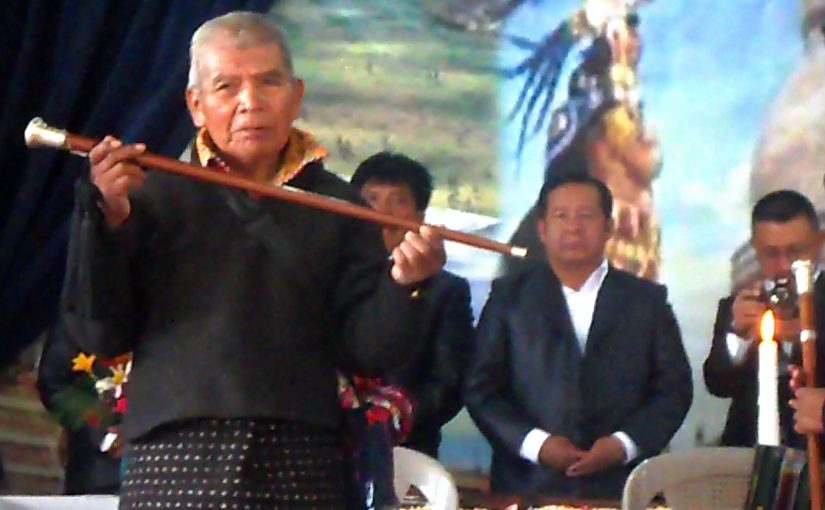This unit introduces the most common greetings. Click on each example, listen to the audio, and read along. Repeat each formula aloud paying attention to Juan Manuel’s pronunciation. Finally, you will also learn several common K’iche’ names.
Le ali, al Tara le ub’i’. Pa le tinamit Boston kape wi re le amaq’ Estados Unidos. Ri are’ tijoxel re k’iche’ pa le tinamit Nawalja’. Je wa’ kub’an ri are’ che uya’ik jun rutzil wachaj pa k’iche’ ch’ab’al:
This is Tara. She is from the city of Boston in the United States. She’s a student of K’iche’ in the town of Nahualá. This is how she greets Nan Mariy in K’iche’:
The following are common greetings:
| Good morning! | |
| Good afternoon! | |
| Good evening! | |
| Good bye! | |
| Sir | |
| Ma’am | |
| Boy | |
| Girl | |
| Good morning, sir! | |
| Good afternoon, ma’am! | |
| Good evening, girl! |
Social status and greetings in K’iche’
K’iche’ greetings change based on the speakers and the context. There are formal and colloquial greetings. In Nahualá, formal address is required to engage town elders, family in-laws, school teachers, church leaders (Catholic priests, catechists, Evangelical pastors) as well as civil authorities (town mayor, departmental governor, and other high government officials). Formal address is also used to address God and other divine beings in religious rituals. It is required to address adult audiences in public functions such as school graduations, political speeches, and masses. Finally, it is commonly used in radio broadcasts to address listeners. Colloquial forms are expected in informal conversations between kin (except between in-laws) as well as between friends. They are also used in market transactions and in brief exchanges between strangers of the same social status.
Watch each of the following short videos paying special attention to the greetings the speakers utilize.
Informal greeting
| A: | Xb’e q’ij! |
| Good afternoon! | |
| B: | Xb’e q’ij |
| Good afternoon! | |
| A: | La utz awach? |
| How are you (informal)? | |
| B: | Utz maltyox – E k’u ri at – La utz awach? |
| Well, thank you – And you? – How are you? | |
| A: | Utz maltyox! |
| Well, thank you! |
Formal greeting (addressed to persons of high social status such as in-laws and town authorities)
| A: | Saqirik tat/nan! |
| Good morning! | |
| B: | Saqirik tat/nan! |
| Good morning! | |
| A: | La utz wach la? |
| How are you (formal)? | |
| B: | Utz maltyox – E k’u ri lal – La utz wach la? |
| Well, thank you! – And you? – How are you? | |
| A: | Utz maltyox! |
| Well, thank you! |
K’iche’ first names
First names are preceded by a particle known as nominal classifier that indicates gender and marital status of the name holder. Some etymologically Spanish names have their own K’iche’ adapted form.
| K’iche’ first name classifiers | masculine | feminine |
|---|---|---|
| children / young adults | a | al |
| older adults / married individuals | tat | nan |
Some common first names in Nahualá
What your-name, girl/boy?
What is your name, girl/boy?
What your-name (formal), sir?
What is your name, sir?
_________ le nub’i’
_________ this my-name
My name is __________
Thank you!
Thank you!
You are welcome! You are welcome!
